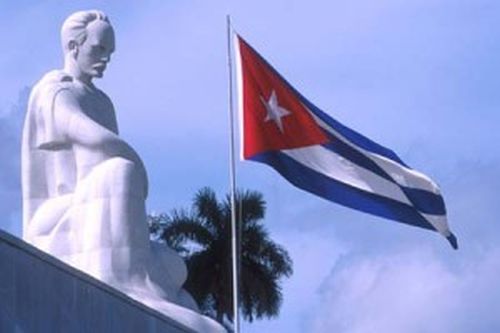The flag of the three blue stripes and the lone star was raised, by the friends of Cuba in the world, in the constant actions against the criminal economic, commercial and financial blockade imposed by the United States more than 60 years ago.
In the year 2023, the solidarity groups demanded the lifting of all coercive measures, the exclusion of Cuba from the spurious list of countries sponsoring terrorism, the normalization of relations between the two countries and the possibility of greater bilateral exchange.
Both in person and on social networks, lovers of justice and people of good will collected funds to send donations to Cuba, and called for different international campaigns to challenge the sanctions and alleviate the discomfort of Cubans due to the material shortages caused by the blockade.
The historical dates and the evocations of the famous patriots of the Cuban liberation struggles served as a pretext to summon the sympathizers of the Revolution, and several solidarity groups and movements made the last weekends of each month true days of support for the Caribbean island.
Special mention should be made of the massive participation in the caravans of cars, which from the United States summon all friends in solidarity to the Caribbean island.
Special mention should be made of the massive participation in the caravans of cars, which from the United States summoned all friends in solidarity to express their rejection of the blockade and the interference and colonizing policy dictated by the White House.
This was complemented with the mobilizations and public acts in front of the U.S. embassies and consulates in different countries, in which an end was demanded to the unconventional war against Cuba and to the lying media campaigns that distort the national reality.
Very notable were the demonstrations of support for the visits of President Miguel Díaz-Canel to Europe, Africa and the United States, where meetings were held with solidarity groups and Cubans living abroad.
INSIDE THE ISLAND
The main actions within the archipelago, this 2023, were marked by Cuba’s pro tempore presidency of the Group of 77 and China, in which consensus was sought to care for the environment, mitigate disasters, stimulate education, culture and sports, exchange between countries and other challenging issues, such as cooperation and trade.
The Summit, held in September in Havana, was attended by representatives headed mostly by the heads of the member states.
Another transcendental space in the strengthening of solidarity with the Island was the Conference The Nation and Emigration, which brought together many Cubans living abroad in the noble feeling of getting closer to their homeland.
Many solidarity actions were also carried out from Cuba for the world. The most notable were the acts, in different provinces, to condemn Israel’s bombing of the Gaza Strip. The culmination was in Havana, with the march and large gathering of the people on November 23.
SOLIDARITY IN 12 MONTHS
Total number of solidarity organizations: 1,649 in 150 countries
Total actions: 7,237
More than 400 pronouncements against:
Title III of the Helms-Burton Act.
Inclusion of Cuba on the list of State sponsors of terrorism.
SOME ACTIONS AGAINST THE BLOCKADE AND IN SOLIDARITY WITH CUBA IN THE YEAR 2023
January 4: Senator Ron Wyden requested support for small and medium-sized businesses in Cuba.
January 16: Demonstration in Seattle.
January 18: 40,000 pounds of humanitarian aid is sent for the victims of Hurricane Ian.
January 19: 160 U.S. lawyers sent a letter to President Biden.
January 20: The Bloomington, Indiana, City Council unanimously approved a resolution.
January 26: Jeffrey W. Bullock, Delaware Secretary of State, and Michael T. Scuse, Delaware Commissioner of Agriculture, called for an end to the blockade against Cuba.
January 29: Caravans were held in more than 20 US cities.
February 10: Washington DC Council adopted a resolution.
February 12: Noam Chomsky and Vijay Prashad published an article in People’s Dispatch.
February 14: The International Committee of Democratic Socialists of America publicized its opposition to the blockade.
February 26: Caravans were held in several US cities.
February 28: The National Network on Cuba called for an end to the blockade.
March 2: The Washtenaw County Commissioner in Ann Arbor, Michigan, approved a resolution.
March 6: Senators Amy Klobuchar, Jerry Moran, Chris Murphy, Roger Marshall and Elizabeth Warren reintroduced the bipartisan Freedom to Export to Cuba bill.
March 14: 20 churches and faith-based organizations sent a letter to Biden.
March 15: Senators Ron Wyden, Cynthia Lummis and Chris Van Hollen sent a letter to President Biden.
March 21: The Washington Office on Latin America and the Center for Democracy in the Americas issued a statement.
March 22: Codepink members heckled Secretary of State Antony Blinken during a Senate Foreign Relations Committee hearing.
March 26: Caravan day against the blockade.
May 10: 21 Democratic congressmen sent a letter to the president.
May 16: The Washington DC Council approved a resolution.
June 25: A week of solidarity with Cuba concluded with a march and rally in front of the White House.
July 27: The Lazaro Cardenas Association in Spain held a panel.
July 30: Caravans against the blockade.
August 10: The Trade Union Confederation of the Americas promotes the Cuba Yes, No Blockade Campaign.
August 13: The National Association of Italy-Cuba Friendship released a communiqué condemning the blockade.
September 15: The French Communist Party publicizes the campaign of political and economic support for Cuba.
October 4: In Germany, cyclists rode 6 km to denounce the blockade.
October 8: Some 119 organizations from 41 countries demanded an end to the blockade.
October 10: Basque associations denounce the blockade.
October 15: Strategies to confront the blockade are analyzed in Boston.
October 29: Massive World Day of solidarity with Cuba in the five continents.
November 5: The Venceremos Movement in Russia plants itself in front of the US Embassy in Moscow.
November 25: In Nicaragua, they condemned the blockade and evoked Fidel Castro.
November 26: Ecuadorians pronounced themselves against the blockade with an ascent of the Rucu Pichincha volcano.
November 26: Public act at the corner of 62nd Street and Nor Miami Avenue, in the city of Miami, Florida.
November 26: Solidarity actions with Cuba are reported in Russia, China, Venezuela, Costa Rica, Mexico, El Salvador and Panama.
December 2: Two containers were closed in Barcelona to send sanitary materials to Cuba.
Dec 10: The Dominican Campaign of Solidarity with Cuba condemned the blockade.
Source: Cuba’s report under United Nations General Assembly resolution 77/7 entitled “Necessity of ending the economic, commercial and financial embargo imposed by the United States of America against Cuba.
 Escambray ENGLISH EDITION
Escambray ENGLISH EDITION





Escambray reserves the right to publish comments.